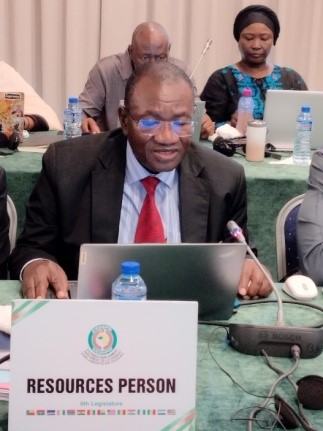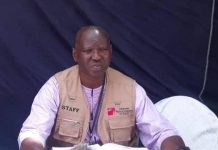By Kebba AF Touray
Dr. Paul-Antoine Marie Ganemtore, an air transport expert, has disclosed that the full potentials of air transport on the socio-economic development of West Africa, is limited by key challenges such as high operating cost and discriminatory airline preference. Dr. Ganemtore made this detailed presentation on Wednesday 7th May 2025, while making a presentation at the ongoing delocalized meeting of the joint committee of the ECOWAS parliament on Infrastructure, Energy and Mines in Lome, the Togolease capital.
According to Dr. Ganemtore, air transport continues to be key in enhancing connectivity, boosting inter-regional trade and expediting the attainment of the regional integration agenda of ECOWAS. He however said that budding challenges is limited to its full potential in supporting the socio-economic development of West Africa.
Dr. Ganemtore’s presentation focused on the supplementary act on air transport taxes, fees and charges in ECOWAS Member States, to reduce the high cost of air travel in the ECOWAS Region due to increase air transport demand, and to establish a balance between the interest of users, end-users, the general public and providers.
“Key challenges such as high operating costs; Regulations and Taxes; Discriminatory airline preference; post COVID 19 impact; limited competition on some routes; lack of airline cooperation, code-share and alliance, retards the full potential of air transport on the socio-economic development of West Africa,’’ he said.
On Regional Integration and Development, Dr. Ganemtore also added that this hinders the barrier to regional integration; inter-regional trade and supply chains and fragments markets.
On the Barrier to Economic Development, he cited that limited competitiveness on the international market; reduction in foreign direct investment; negative impact on tourism and education as some of the challenges.
“Limited access to social services healthcare and education, and market consolidation, are some of the negative social impacts that restricts the mobility of people,” he said, adding that the Regional Airlines Industry is challenged with bankruptcy; lack of competitiveness and lack of strong regional hubs. He indicated that the situation of air transport continues to witness increment in taxes, fees and charges, ranging from 47 percent for national flights, 81 percent for regional flights and 74 percent for international flights. He recommended an effective economic oversight mechanism to prevent the abuse of dominant positions by provider; non-discrimination and transparency; charges cost related; consultation with users by providers and the protection of the interest of all users and end-users. He also recommended the need for the establishment of an independent body with economic oversight functions with defined authoritative responsibilities and resources.
“If these are implemented, it will lead to reduction in air fares for passengers and will contribute to economic development and regional integration, and stimulation of air transport demand in West Africa,” he said.
Meanwhile, the final Communique of the Authority of Heads of States and Governments of ECOWAS at its 65th Ordinary Session on 7th July 2024 in Abuja, decided in Paragraph 17 the following: “The Authority raises concerns about the high cost of Air Travel in the ECOWAS Region and this has negatively impacted on the development of tourism, trade and the free movement of persons and services.”
The Authority directs Air Transport Ministers, and Civil Aviation Authorities of Member States to work with the ECOWAS Commission to implement the ECOWAS Common Policy on Aviation Charges, Taxes and Fees, with the aim of using air transport to expedite economic development and deepen regional integration. It also directed the adoption of a supplementary Act in relation to the Common Policy on aviation charges, taxes, fees in the ECOWAS Member states, by 15th December 2024, by the Authority of Heads of States and Governments.




















